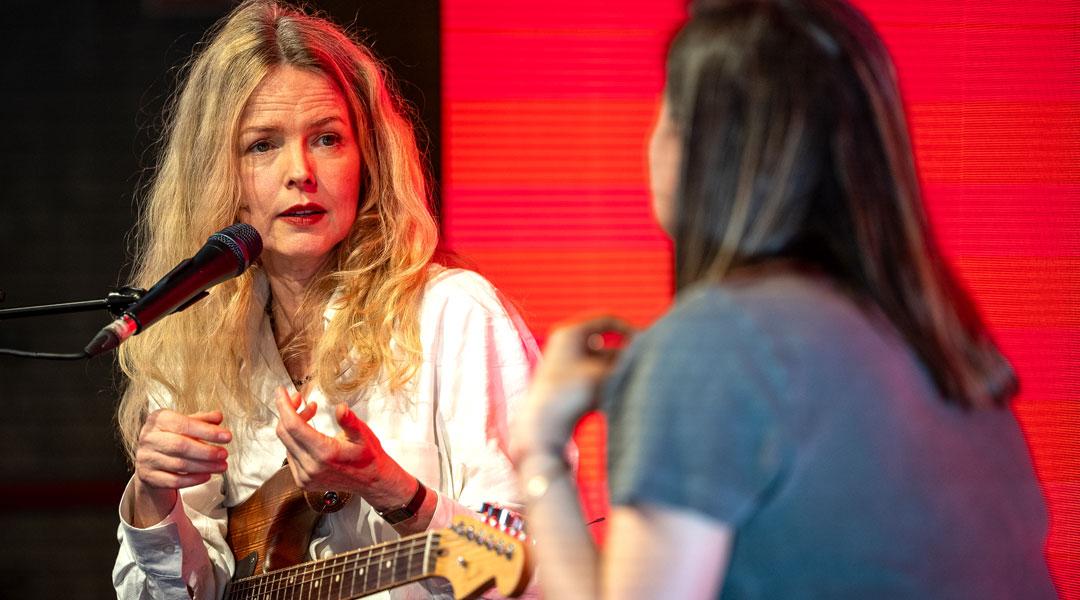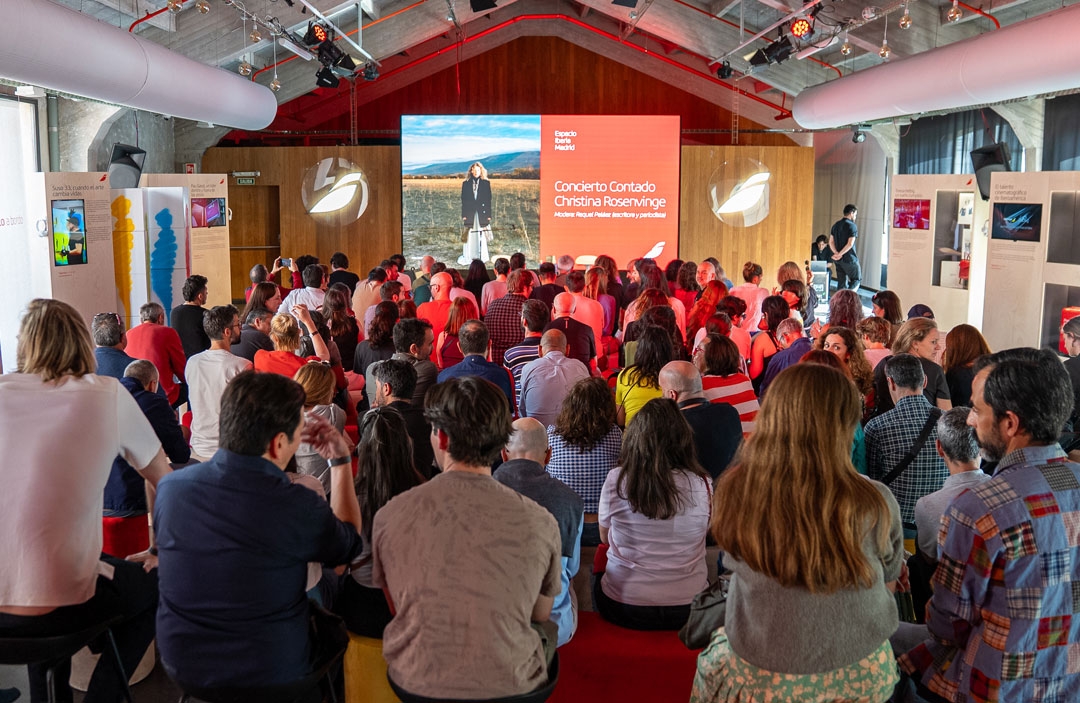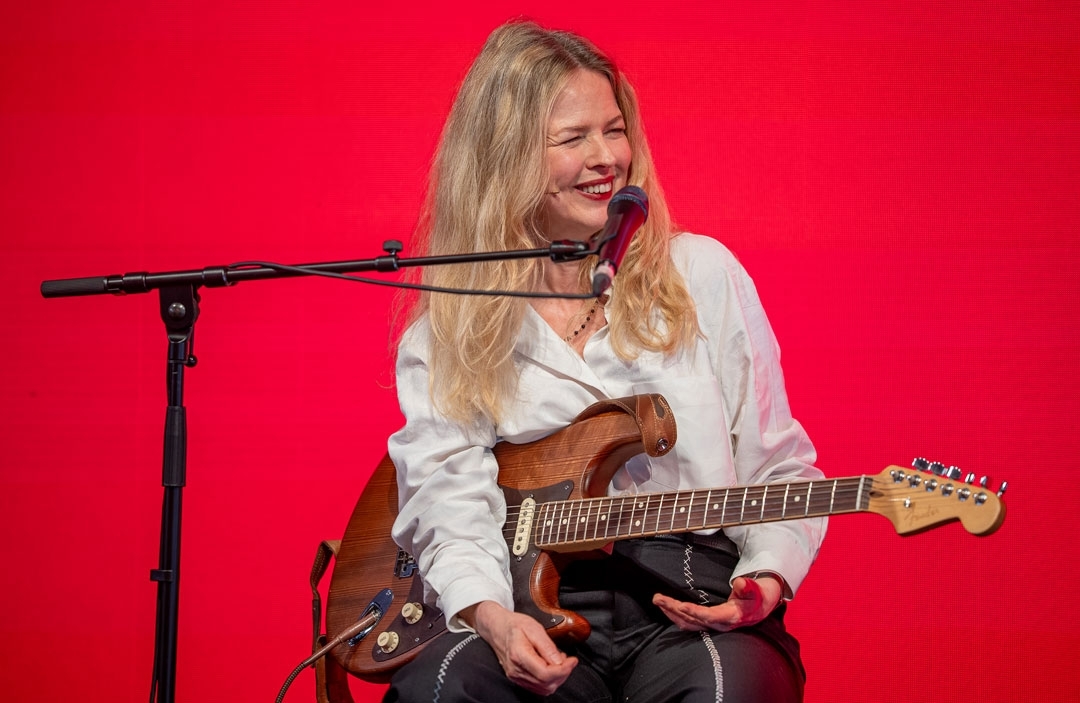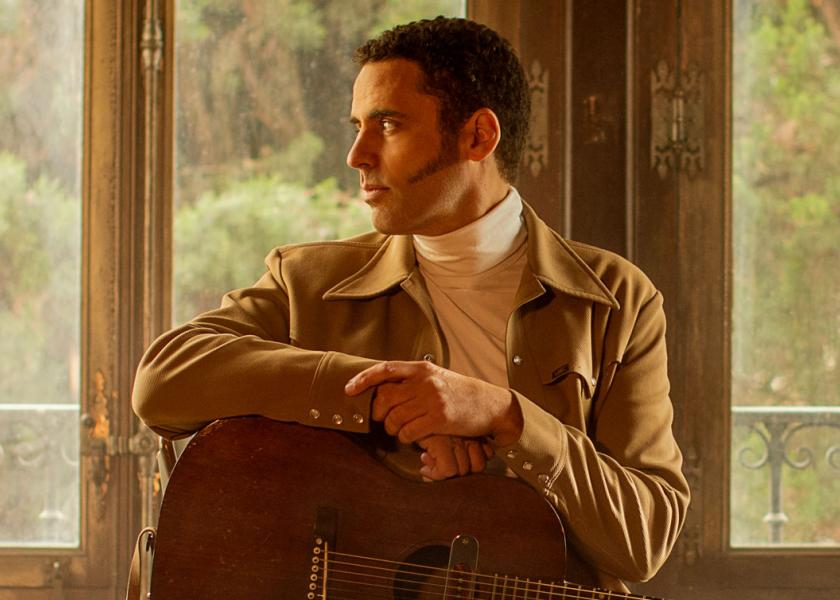Christina Rosenvinge
Songwriting

With more than four decades behind her and a vast and memorable songbook, Christina Rosenvinge is a Spanish music icon. During her visit to Espacio Iberia, she revealed some of her secrets as a songwriter, as well as going over the songs on her latest album, ‘Los versos sáficos,’ and talking about creating her first soundtrack for the film ‘Fine Young Men.’
“Dear brothers and sisters, we are here today in honour of a legend of Spanish music: Christina Rosenvinge.” This is how the journalist Raquel Peláez presented the Concierto contado [Spoken concert] offered by this artist from Madrid at a packed Espacio Iberia. An hour-long conversation started with the ideal icebreaker: What’s the weirdest thing you’ve done on a plane? “I’d love to have a great story for you, but I don’t… In any case, I know where you’re going with this and, even if it had happened, I wouldn’t tell you,” answered a knowing Christina, making the audience smile. An audience who has been faithful to this singer for four decades, who knows if the reason is written in the stars. “My singing teacher said that a voice doesn’t have to be perfect, but it needs to connect with the universe. She said that the universe is made of frequencies and only those who are perceptive enough to tune into them connect with the audience. That is, you can achieve this with a less virtuous or harmonic voice. It’s something beautiful that would explain, for example, Bob Dylan’s career, which I love.”
Back on Earth, the conversation turned towards creating the soundtrack for Fine Young Men, one of Christina’s most recent projects in a long line of successes. The film explores homophobia and social pressure in a Catholic school where masculinity is measured in terms of aggression and violence. “It analyzes the inner workings of a patriarchal society—Christina explains—which strips caring and innocent teenage boys of their true nature to turn them into macho men. There’s a lot of talk about the effects of sexism on women, but not so much about the impact it also has on men. Feminism isn’t here to strip men of their rights, but rather to free them from toxic masculinity, for example.” Feminism has always been part of her career, as she herself reminded us: “In Que me parta un rayo (1992) by Christina y Los Subterráneos there were already songs about that which were quite critical, like Tú por mí or Voy en tu coche. Also in El souvenir, with Álex and Christina, which opened El ángel y el diablo (1989).”

The audience awaits Christina Rosenvinge’s sold-out performance at Espacio Iberia.
With her lyrics, Christina has always revealed a lot about herself, but also about the successive eras she has lived through throughout her extensive career: “I came to music through lyrics: first I wrote them for other people, and then for myself. Songwriting is relatively accidental, but there’s also an almost scientific methodology behind it. In La palabra exacta [an essay about the art of songwriting that closes her book Debut] I tried to dissect that methodology so that anyone could write a song. For something to be sung, you need to keep phonetics in mind. In fact, lyrics often become a kind of phonetic sudoku where you can’t say what you want but rather what fits the melody. You want to put something in a song, but you can’t, and what comes out reveals something about your soul, sometimes even foreseeing the future. There’s something Freudian about it.”
“Normally, we musicians plunder our own experiences to write lyrics, and that can sometimes be exhausting”
Rosenvinge’s career started at the beginning of the 1980s with a punk band, Ella y los Neumáticos, which was part of La Movida in Madrid. Therefore, few artists have such a vast and memorable repertoire. Her latest songs, which make up the album Los versos sáficos, aren’t original, but are based on texts by the Greek poet Sappho. “Normally, we musicians plunder our own experiences to write lyrics, and that can sometimes be exhausting. Writing lyrics based on someone else’s work has been wonderfully liberating.” This album comes from a play, Safo, which was performed at the Mérida International Classical Theater Festival in 2022. “Marta [Pazos] put on such a visually hypnotic performance —Christina remembers— that people didn’t pay enough attention to my carefully crafted lyrics. I felt a bit frustrated, which is why I produced the album and went on tour with it.” Next, Christina picked up her guitar and played her own ode to Aphrodite, Himno a Afrodita: “Sappho’s work is extensive, but this is the only complete poem that has reached us, and mine is a straightforward adaptation. When I went to rehearsals, people said: what a banger! They thought it was mine because, even today, Sappho sounds really modern.”
At the turn of the century, Christina produced three albums in English: Frozen Pool (2001), Foreign Land (2003) and Continental 62 (2006). “People say it’s easier to write in English than in Spanish, but they are two different games really. The advantage of English is that it’s more concise. A songwriter’s greatest ally is, alongside copyright, the monosyllable. There are loads in English, and with five syllables you can build a verse. Spanish, on the other hand, requires longer melodies, and that’s good for some genres but not for pop, which needs to be more succinct.” Quoting Debut, Christina’s book, the event’s host reminded the audience that in English, “love” only rhymes with “dove” and “above,” but that its Spanish equivalent, “amor,” rhymes with more than two thousand words. Her relationship with other languages isn’t limited to English; proof of this is an anecdote that Christina pulled from her humble beginnings: “I used to translate lyrics by French artists into Spanish. It was a behind-the-scenes job, but it allowed me to buy a convertible… third hand.”

Christina Rosenvinge played several songs from her latest album, ‘Los versos sáficos.’
After playing Hoy duermo sola, another of the songs on Los versos sáficos that is inspired by the tragic romance between Tithonus and the goddess Eos, Peláez asked Rosenvinge about her experience working with both men and women. “There are differences,” she admitted, but she was quick to remind us that, in general, she has worked with great professionals and defended the time shared with other musicians as a stronghold for freedom and complicity. “If only the outside world were like that!” she added. Some of her most positive experiences have been her collaborations with the iconic Lee Ranaldo [cofounder of Sonic Youth], and her least, the recording of a cult album, Verano fatal (2007), alongside Nacho Vegas. “It wasn’t my band, it was Nacho’s, and when I got there, one person saw me as an intruder. As far as I know, they’re no longer in the music industry. It was one of the first things I did after coming back from New York, and things happened that I thought I’d overcome.” Men’s and women’s experience of success isn’t the same either. “When I talk to other girlfriends about this, we agree that, in our case, it complicates relationships. It seems like it makes us more intimidating.”
Christina closed her tour of Los versos sáficos with Canción de boda. “My goal was for it to feel like a song that has always existed, as if it had been played at weddings for centuries. Do you think I succeeded?” Her fans’ reply was a resounding yes, and the artist suggested they play it for their nuptials and send her a video. She even left the door open to being invited as a guest: “I don’t hate weddings; I just don’t get invited. It’s been too long since I’ve been to one!” Christina, who has never married, is aware that one of the greatest loves of her life has been her audience and, at Espacio Iberia, based on the generous applause and smiling faces that bid her farewell, they renewed their vows.


